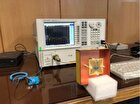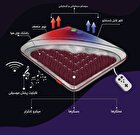Iranian Researchers Discover New Method for Drug Screening of Modeling of Liver Cancer

In a study that was carried out in collective teamwork by researchers from Tehran-based Shahid Beheshti University, University of Dundee in Scotland, Pasteur Institute of Iran and the Iranian Biological Resource Center (IBRC), the use of scaffolds obtained from the decellularized leaves of the eggplant plant was studied to assess and examine the drug response and liver cancer modeling.
This study, which was inspired by and copied from the microenvironments of cancer tissue in 3D cell culture systems, was conducted as a study model for drug assessment and screening with the aim of filling the knowledge gap between laboratory research and clinical and in vivo studies.
Through this innovative strategy, researchers can study the interactions of cells with each other, cell signaling pathways, and their responses to external stimuli and drugs in a physiological environment more similar to the body.
The results of this research showed that the 3D scaffold produced from natural cellulose with surface trichomes and topographical features inspired by nature can be used as a microenvironment for liver cancer tissue culture for the investigation and screening of chemotherapy drugs.
4155/i





















